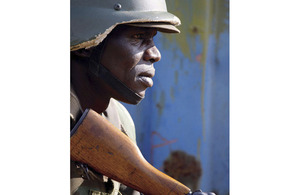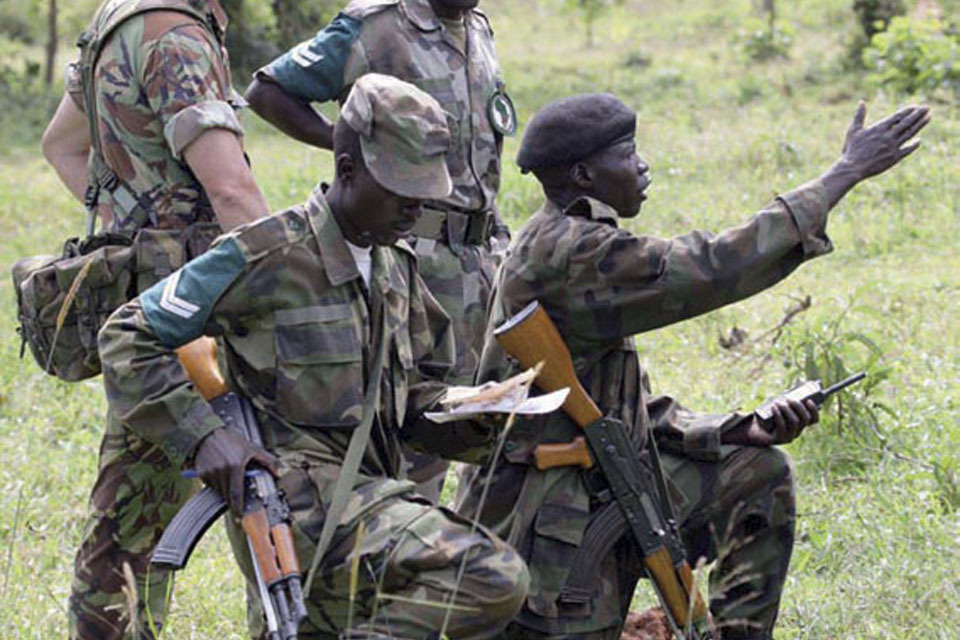Training Ugandans for Somalia deployment
A British training team puts Ugandan troops through their paces on the eve of deployment to Somalia. Report by Sharon Kean.

A Uganda People's Defence Force soldier takes cover during a mission rehearsal exercise at Singo training camp [Picture: Steve Dock, Crown Copyright/MOD 2010]
A company of Ugandan soldiers braved the scorching sub-Saharan sun with a smile and small trickle of sweat as they manoeuvred into position around a bridge captured by enemy forces.
British officers looked on as troops from UGABAG 7 - the latest battalion of the Uganda People’s Defence Force (UPDF) to deploy on peacekeeping operations in the war-torn Somali capital of Mogadishu - went through their final mission rehearsal exercise.
Following an intensive training package designed to ready the African soldiers for urban warfare, a small British Army contingent arrived at the Singo training camp to the north of Kampala, to assess how much the students had learned.
Captain James Titchener, 3rd Battalion The Princess of Wales’s Royal Regiment (3 PWRR), the officer tasked with project-managing the two-week mentoring trip to Uganda, explains:
We come up with various scenarios such as vehicle IEDs, suicide bombers, drive-by shootings and genuine visitors to a camp.
The UK short-term training team had been brought in to share crucial counter-insurgency experience gained in Iraq and Afghanistan with their African allies.
The British brief was to plan, run and assess a full-scale battle group exercise for the deploying troops, testing their basic soldiering skills and ensuring the Ugandans could organise and execute operations:
They have grasped the process of how ops are put together and when they want to they can be really quite good,” said Lieutenant Colonel Geoff Minton, 3 PWRR, commanding officer of the 20-strong mentoring unit.
They’re not so good at self-control - they know the drills for contacts but when they are actually under fire they get carried away and don’t do a lot of it. Their main strength is their enthusiasm.
The 1,800 Ugandan troops carried out urban patrols, cordon and search drills and reactive operations, and dealt with mass-casualty situations on the military training base.
Lieutenant General Katumba Wamala said that making the transition from countryside to urban surroundings had been the key training objective for his men:
Largely speaking the challenge we have on the military side is a new operational environment - we have not dealt with an insurgency or with counter-terrorism for the last 20 years in this country,” he said.
What we are faced with in Mogadishu is urban terrorism operations.
An intensive 16-week pre-deployment package run by the US-funded African Contingency Operations Training and Assistance programme at Singo is designed to prepare for such a mission.
A mock village has been built from shipping containers in a bid to mimic the streets and buildings in which the Ugandan soldiers are likely to find themselves fighting.
On-site mud huts, where personnel and their families live, were incorporated into some of the exercises, giving the troops valuable experience of dealing with civilians, a skill that will be essential when they deploy to the troubled Somali capital:
We are keen to get Ugandans dealing with the local population as one of the problems in Mogadishu in the past was that they were reacting aggressively to people and that doesn’t help when you’re trying to win the hearts and minds,” said Lt Col Minton.
All of my guys have been to Afghanistan and are using their experiences from there and from TELIC [Iraq] to help them with this.
During the operation to secure the bridge, soldiers dropped to the ground and adopted firing positions as a surprise enemy ambush took place.
Two British officers monitored their performance and offered tactical tips where necessary:
The Ugandans have a tendency to all run down the road and manoeuvre while shooting,” said Captain Ollie Tag, 3 PWRR.
While one guy fires the others should move but they don’t always do it that way.
Lance Corporal Anthony McMannus, Royal Army Medical Corps, joined the exercising group for the casualty serial and was impressed with the level of skill he witnessed:
They’ve been applying tourniquets and splints on leg breaks and they know how to do chest seals with three-sided tape,” he said. “The base knowledge is there and once you get them to think about what they are supposed to do they can do it.
Although the primary role of the British team was to assess the Ugandan troops, any advice and information they passed on was invariably gladly received:
We are helping people who are about to be deployed operationally to enhance their tactics,” said Captain Stewart Barker, 3 PWRR.
It’s key core soldiering skills and low-level tactics, but also the way they deploy those tactics.
Command and control is quite difficult here sometimes. They don’t have some of the equipment that we have to enable them to manoeuvre units easily around terrain, but there are ways of compensating for that tactically.
That’s what we are here for, to help them reach a good operational standard.
Captain Will Mawby, Royal Artillery, was responsible for running enemy forces during a cordon and search drill and said he had come up with a few surprises to test the Ugandan soldiers:
I tried to add some reality by throwing in a few quirks such as local civilians shooting at them and essentially trying to disrupt their operation by creating a bit of confusion. It’s quite likely they will have to deal with that in Somalia,” he said.
The stuff we are training them on is taken from experiences in Afghanistan and Iraq. We are trying to put it into a Somali context. The Ugandans are very keen and that’s half the battle.
They don’t have the resources, background or the ability to operate as we would. However, the improvement over the past couple of days has been quite significant.
Patrolling through the mock village, Warrant Officer Class 2 Jim McAllister, The Royal Irish Regiment, oversaw an intelligence-led search operation focused on a two-storey building crafted from shipping containers, where soldiers had been briefed that the enemy were making IEDs:
Their skills are low but the will is high and we can only do so much,” he said.
Workplace training for us is in Afghanistan and you’re still learning when you go out there. It will be the same for them in Somalia.
Captain Stephen Tayebwa, the battle captain for UGABAG 7, co-ordinated the exercise from a makeshift tactical operations centre housed in a tin-roofed barn.
He said the pre-deployment training and UK-led final serial meant his battle group are better prepared for the challenges of Mogadishu than they were last time he deployed two years ago:
It has been an absolutely successful mission, we’ve acquired knowledge from the British and they are friendly people,” he said.
Their military tactics are superb and as far as the impending deployment is concerned they have given us the right skills.
This time we are more prepared for dealing with IEDs and for urban patrolling and fighting. We are looking forward to bringing peace and stability to Somalia.
Major Sam Kuteesa, the commanding officer of the battle group, agreed that the British input to the exercise was extremely valuable:
Their mission in Afghanistan is almost the same as ours in Mogadishu,” he said.
The tactics are the same and the experience of the UK and USA in Helmand has boosted us and I hope this helps us to overcome the challenges in Somalia.
We have gained a lot from the British troops - staff work, skills and tactics which will be useful to us on the ground.
Having been trained and tested for the streets of Somalia, only time will tell how successful the Ugandan mission to Mogadishu will be. Exposure to the reality of theatre will be the troops’ ultimate final exercise.

A British Army mentor supervises soldiers from the Uganda People's Defence Force as they practise their skills [Picture: Steve Dock, Crown Copyright/MOD 2010]
Foreign forces help Ugandan peacekeepers
The 16-week pre-deployment training course in Singo is partly funded and led by the US African Contingency Operations Training and Assistance programme, which provides field and staff training and equipment for peacekeeping forces.
Ex-US Army Staff Sergeant Matthew Anderson helped coach the latest group of UPDF soldiers destined for Mogadishu, building up their basic soldiering and operational skills:
The lessons are practical with very little taking place in the classroom,” he explained.
They learn more by practising, I think we all do. For example, we get them out patrolling in the village so they learn that if they’re nice to the civvies they’ll get a lot more information. You don’t want peacekeeping forces to go in and take advantage.
A unit from the French Foreign Legion also visited Singo to help educate staff before the British Army’s short-term training team arrived for the final exercise:
They have come on in leaps and bounds, until the last serial you need to encourage them a little,” said Mr Anderson.
We’ve dumped a lot of information on them in pre-deployment training and now we’re seeing how they put it together. We want them to react to contact and for the first person who sees the enemy to tell people. That’s the most simple patrolling task.
Mr Anderson said he had tried to pass on the many valuable lessons he learned while working as a military medic in Iraq:
They have lots of experience of patrolling in the bush from past wars, but now they have peacekeeping in Mogadishu, which won’t be peaceful. It will be fighting every day in a different environment.
This training is about trying to give them more confidence so they don’t all shoot at the same time. The number of civilian casualties will go down if we are successful.
They’ve had the training, they just need to put it all together.